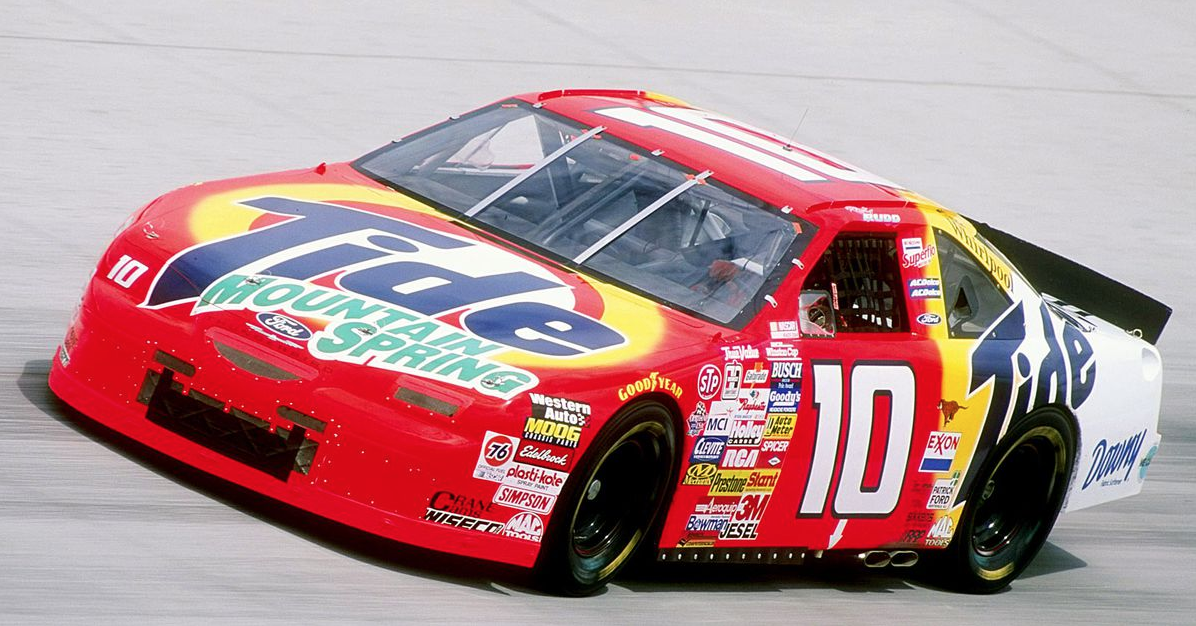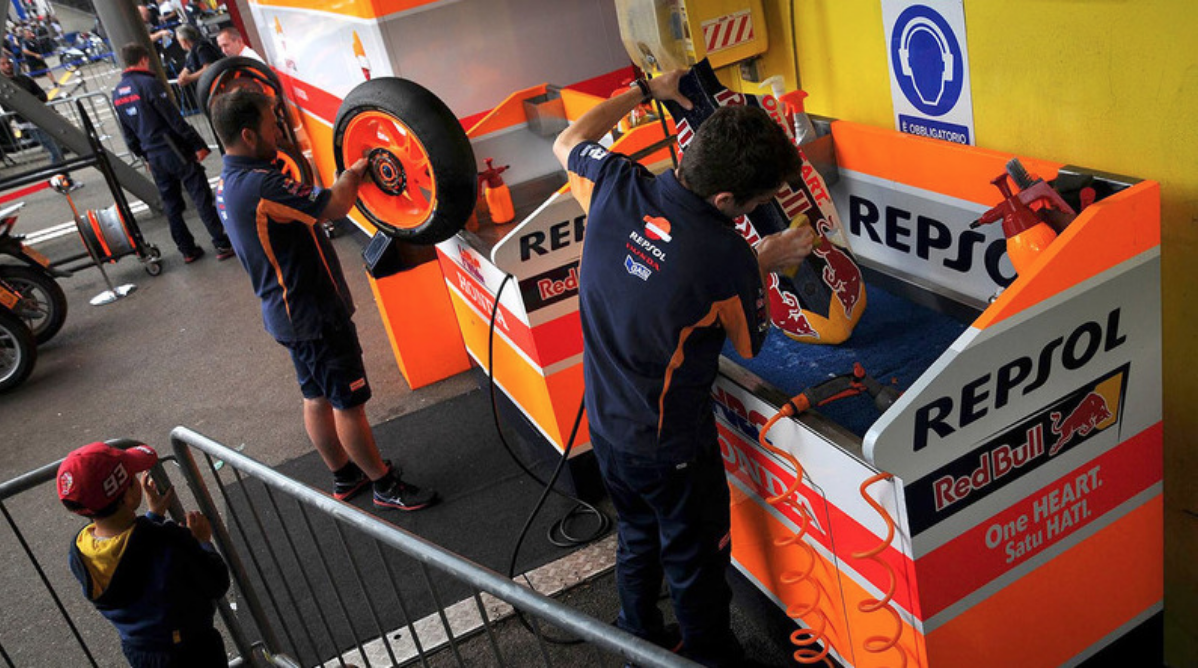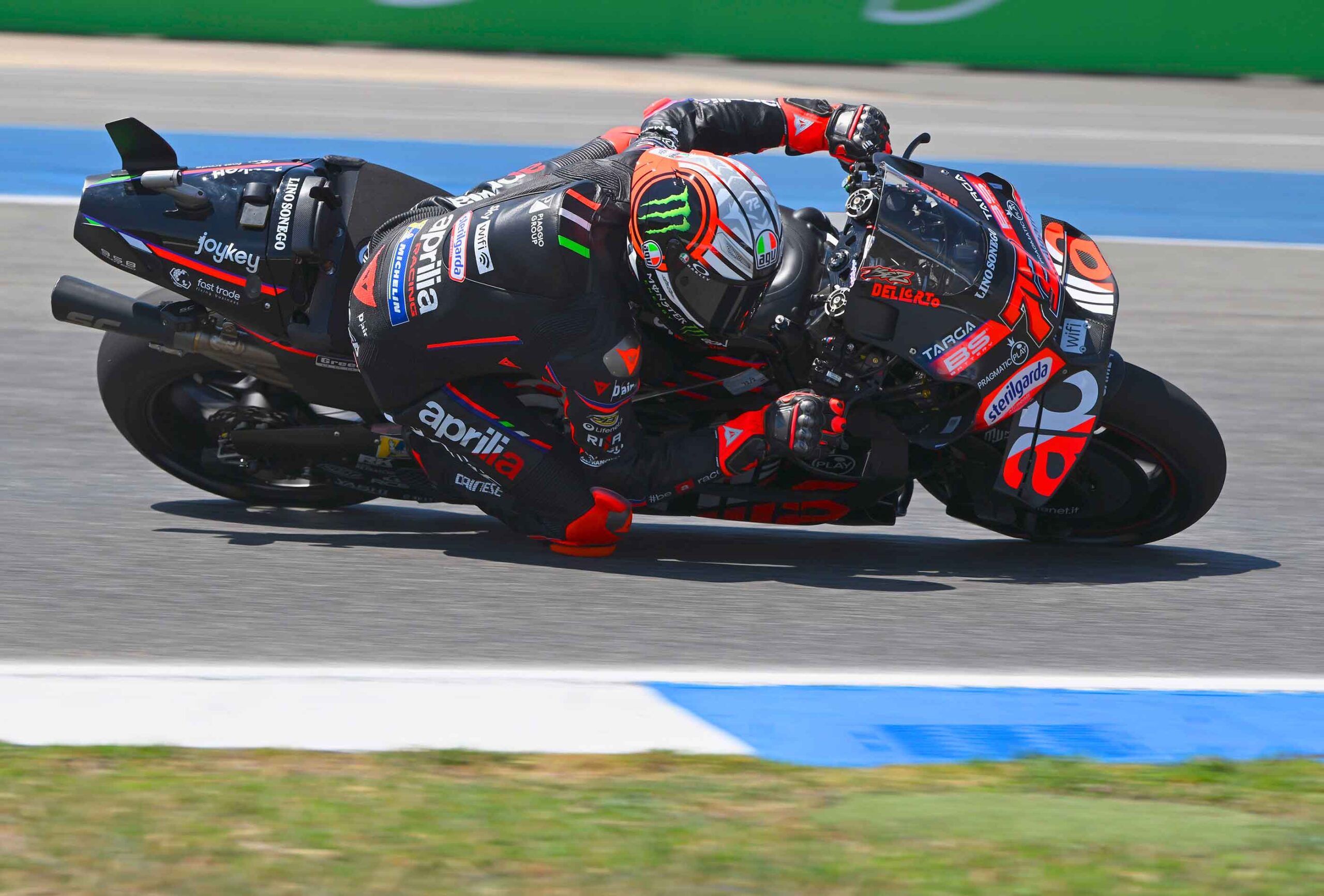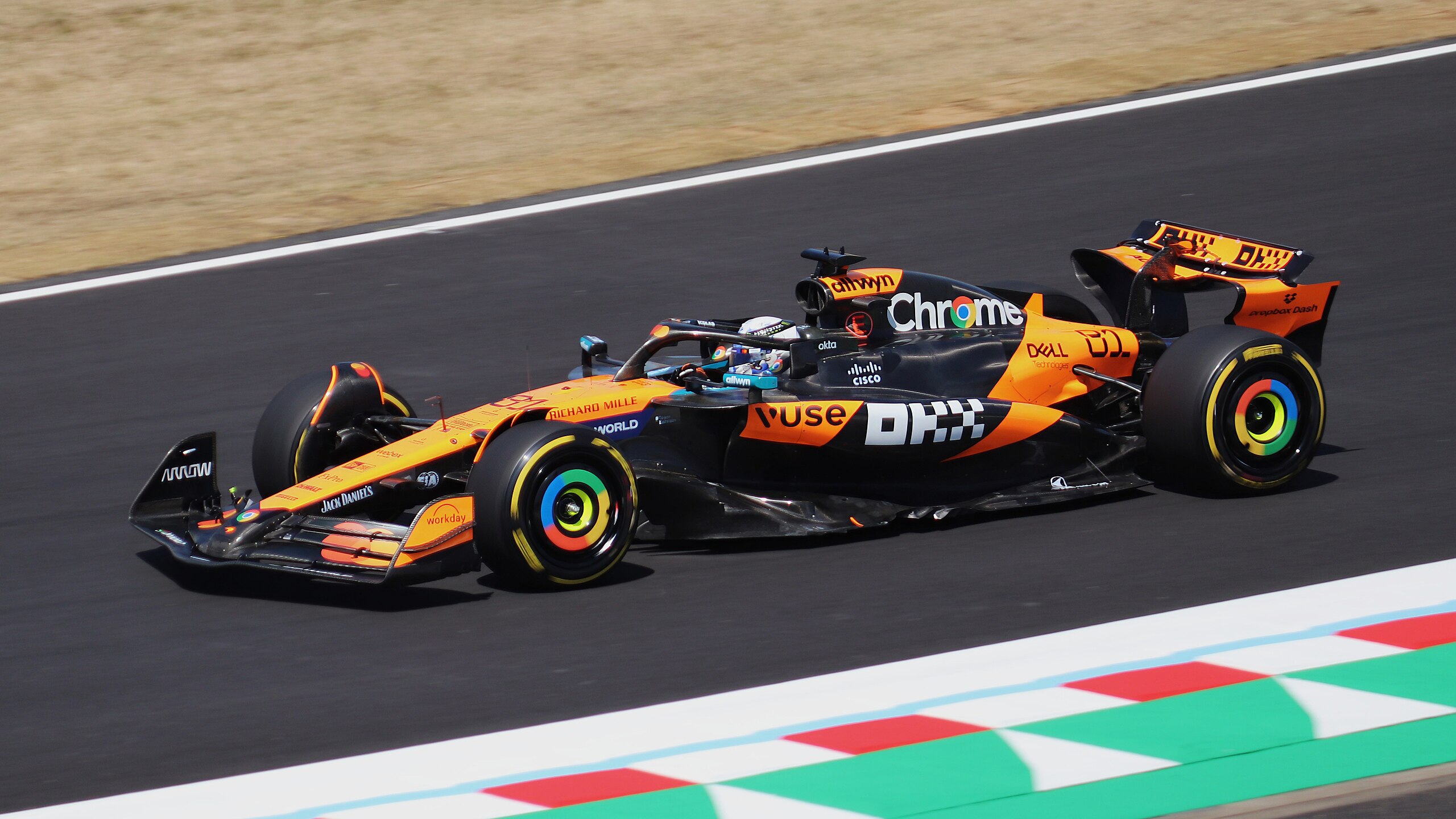Are you willing to sponsor?
Are you ready to explore the transformative power of athlete sponsorship for your brand? Click here to learn more about how sponsorship can help brands grow and thrive in the exciting world of motorsports.
By Riccardo Tafà| Posted March 26, 2019 | In MotoGP, Sport Sponsorship
History has it that the world of motor racing has little to do with some product categories. If we made a list of such products, soaps and detergents would definitely be on top of it. My feeling is that this is a great chance missed: putting together MotoGP and household products, for instance, may offer the opportunity to start significant sports marketing programs.
This is true for two main reasons:

One aspect that normally impresses anyone visiting a motorsports factory is cleanliness, combined with incredible tidiness. Floors, surfaces, window panes, work benches and all tools are in perfect order and impeccable, above all. Some work processes, to mention an example, are even carried out in “clean rooms”: these are fully dust-free rooms typically used for productions in the pharmaceutical, food processing or micro electric industry.
The feeling is the same when you go to a racing track to follow the main activities of the teams, i.e. racing and serving their partners. Everything is clean, tidy and orderly. Care is the common denominator in boxes, garages, and hospitalities, as well as in service locations.
So, do you really think that there is a better “shop window” to demonstrate what your product, cloth or spray can do? Anyone can easily recall to mind mechanics cleaning a motorcycle fairing or the sides of a racing car or the visor of a driver’s helmet using a spray and a microfiber cloth. Only a few, however, are aware of how clean hospitalities are or how perfect garages are. Don’t miss the chance to give your guests this opportunity and to create a good impression!
Why is the world of racing so madly fond of cleanliness and tidiness to such extent that they have become an integral part of the business? There are two main answers to this question: the first is performance, while the second is control.
Firstly, dust, debris, dirt and other foreign matter contribute to deteriorating mechanical parts and prevent them from operating perfectly. In a world where one-tenth of a second makes the difference, the conditions of each component must be more than merely excellent. The only way to achieve the above is by continuous cleaning, maintenance, and care. Secondly, constant cleaning and checking (i.e. handling) of the materials help mechanics understand whether parts are integer and free of damage which may jeopardize the race results or, in the worst case, pose a hazard for the driver/racer. Cleaning in racing is not merely an exercise of style: it is rather a life-saving activity.

The second point relates to the purchasing manager (PM) who buys soaps and detergents. Despite common thinking, this is no longer a women’s prerogative. The world has changed in this area too …. thank God.
According to the Office for National Statistic, 7.7 million people in England live on their own and 58% of these households consist of single men who have to take care of each and every aspect connected to the daily care of their body and household. According to Istat, the Italian National Statistic Institute, the situation in Italy is not much different. Here too, men and young men of all ages daily deal with floor cleansers, Marseille soaps, fabric softeners and wash machine caps (and they state they do it with great satisfaction).
After focusing on “household” cleaning, the time has come to draw attention to the huge market of clothes hygiene and washing. This market too offers anyone interested in the sponsorship sector a lot of food for thought: all members of staff at the race track proudly wear uniforms that identify their team. Staff includes mechanics, engineers, press officers and managers who display the brand of their partners and the manufacturers whom they represent while performing their jobs.
Although the work of mechanics is traditionally associated with oily hands and trousers and T-shirts fouled with grease, you will never find a MotoGP or F1 mechanic wearing a stained uniform. They have, of course, many sets of uniforms at hand, but another reason for the above is that uniforms are thoroughly washed and ironed after each race and they live through the season unspoiled. My mind immediately goes to some past ads where the whitening property of some detergents was combined with their gentleness on fabrics. Motorsports mechanics and their uniforms may be taken as a perfect example of such a situation.
The same connection may quite easily be made with consumer electronics, as well as with washing machines and tumble dryers that return spick-and-span clothes, often to be worn the weekends after the back-to-back races.
Is it merely a matter of hygiene and cleanliness? Well, honestly, there is more to it: it is valued to be passed on. The crystal clean uniforms are the means through which the image of the team is transferred to the outer world. The teams represent excellent storytelling opportunities for manufacturers of washing machines and tumble dryers who may use a discipline like this where values such as speed, reliability, and strength are easy to communicate.
One thing we need to refrain from doing is to let stereotypes take over, as this may lead to think that certain product categories are not suitable for some specific sports. A typical stereotype may be that a female product should necessarily be connected to female sports like volleyball. Why? The number of women watching MotoGP, soccer or rugby is now a seven-digit figure.
This topic definitely deserves further debate in other posts where examples may be mentioned of new product categories which may, at first sight, appear to have little to do with motorsports, but actually, have a lot in common with them at a more in-depth examination.
Enjoyed this post? Do not miss the chance to share it!
Are you ready to explore the transformative power of athlete sponsorship for your brand? Click here to learn more about how sponsorship can help brands grow and thrive in the exciting world of motorsports.

Managing Director for RTR Sports, Riccardo graduated in law at the University of Bologna. He began his career in London in PR, then started working in two and four-wheelers. A brief move to Monaco followed before returning to Italy. There he founded RTR, first a consulting firm and then a sports marketing company which, eventually, he moved back to London.
The online platform where you can discover the latest trends, strategies and insights from the exciting world of sports marketing.
View our blog
June 17, 2025
Starting in 2027, MotoGP is preparing for a momentous change that will redefine the face of motorcycling’s premier class. The new technical rules, announced by the Grand Prix Commission[...]
Read More
June 11, 2025
After 11 years, Marc Marquez is leaving Honda HRC to join Team Gresini. This was announced in a laconic press release, without signatures or photos, by the same House with the Wing. The same [...]
Read More
May 6, 2025
In the world of motorsport sponsorship, speed and performance have traditionally reigned supreme. However, a new race is underway, one towards sustainability. Both Formula 1 and MotoGP are st[...]
Read MoreIn an era where it is possible to get anywhere with a click, there is a strong temptation to approach teams and properties directly for sponsorship projects.
By doing so, we are convinced that we are shortening the value chain, saving time and money. However, these DYI methods are anything but risk-free and what initially appears to be a competitive advantage soon turns into a problem that is difficult to resolve. That’s why there are agencies. And this is why you should rely on us for your sponsorships.
When first approaching a sponsorship or sports marketing project, it is difficult to know immediately which stakeholders are correct, what the decision flow is, and what the right timelines are for each process. Sports is a very specialized field of action, and fitting effectively into its paths can take a lot of time and therefore money. We, on the other hand, know referents and spheres of action and know who to talk to, when and how. So you are also more effective.
Sports is an immense passion, and for our heart colors we would be willing to do anything. But business is a different business, and it is important to make the best possible strategic decisions based on independent research, statistics and reliable data. A sports marketing and sports sponsorship agency like RTR has an objective, 360-degree picture of the scenario and can tell you what is really best for you: which sport, which athlete, which team. This is because we possess a great deal of data and information on ratings, segmentation and attitudes. Because the numbers don’t lie. Never.
Activations are the real heart of sports sponsorship. Without them, there remains only a blank sticker on a motorcycle, car or uniform and no contact with the public, no emotional connection, no impact on the bottom line. Then how do you do it? It certainly won’t be the teams or the athletes who will help you leverage sponsorship and enjoy the many marketing rights you have paid for. To bring out the best in a sports marketing project you need an agency that knows how to use sponsorship to engage the fanbase on the Web, to reach out to Shopping Centers, to organize hospitality, to develop B2B and B2C opportunities, and to get “your” athletes in front of millions of potential consumers.
Would you ever go to the dealer who sold you the car and ask if the competitor’s car is better? No, of course. So, how do you expect to get firm measurements of the effectiveness of your sponsorship if you do not rely on someone super partes? At RTR, we have always worked with independent third-party agencies that allow us to know the return on any exposure of your brand on TV and in the media. In addition, we believe in calculating ROI as the ultimate measure of your success-so we can tell you for every penny you spend how much you are making.
We have been involved in sports sponsorship and sports marketing for more than 15 years. We are consultants in the sense that our goal is to maximize your investment, but we are also an agency that manages the project from start to finish. We have been doing this since 1995 with passion and professionalism, following three principles that have become cornerstones of our business: independence, verticality and transparency.
I would like to highlight the fact that one of the qualities of RTR is its great ability to approach the sponsorship scenario strategically, together with its passionate attitude, its amazing enthusiasm for solving problems, and its high level of professionalism.
Gianluca Degliesposti
Executive Director Server&Storage EMEA
Eurosport is truly delighted with its business relationship with Riccardo Tafà, who has become extremely popular, thanks to his detailed knowledge of the sports marketing sector and his highly diligent attitude to work.
Francois Ribeiro
Commercial Director
Passion and Expertise are the features that I have found in RTR since the very beginning. Serious and reliable professionals but also very helpful, nice and open-mind people, willing to listen and compare different ideas. All the values in which RTR believes make this agency a partner, not just a supplier, a partner with whom we have had the opportunity to achieve significant commercial results in term of success and image.
Luca Pacitto
Head of Communication
We have been working with RTR Sports Marketing for over 10 years. The objectives and the programmes of collaboration continue to be renewed and to grow with mutual satisfaction. I believe RTR is a team of great professionals led by Riccardo Tafà, who I consider a manager of exceptional skills and with a great passion for his work.
Lucio Cecchinello
Team Principal
I have known and worked with Riccardo Tafà since 1995 when we collaborated for the first time on a project for the Williams Formula 1 team. Several clients followed. After leaving Williams to work for Gerhard Berger then owner of the Toro Rosso F1 Team, I turned again to Riccardo to seek his help in finding a tool supplier for the team and Riccardo duly obliged with an introduction to USAG, a partnership with Toro Rosso which endured for five years. I recently started a new role as Group Commercial Director for the renowned Andretti Autosport organisation and I find myself working with Riccardo once again on a number of interesting projects. Why has this relationship with Riccardo endured ? He’s smart, knows the commercial side of sport inside out and back to front and he’s honest and trustworthy. Riccardo Tafà is a “doer” not a “talker”: in over 20 years I have never had a dispute either with him or with a company that he has introduced and each partnership introduced by Riccardo has delivered quantifiable ROI to rights holder and sponsor alike. I can think of no better testimonial of Riccardo’s diligence, knowledge, contact base and hard work than that.
Jim Wright
Group Commercial Director
The online platform where you can discover the latest trends, strategies and insights from the exciting world of sports marketing.
View our blog
July 1, 2025
In the complex and exciting world of Formula 1, performance no longer belongs exclusively to wind tunnels and race strategies. It also unfolds in boardrooms, brand labs, and experiential mark[...]
Read More
June 26, 2025
The European Commission has provided Liberty Media Corporation with unconditional approval to complete the acquisition of the MotoGP World Championship. The process of annexing the top motorc[...]
Read More
June 18, 2025
When you think of sports, what comes to mind? For many, the answer is sports marketing management. We see Super Bowl or Olympic commercials and it seems like every other product is marketed t[...]
Read More